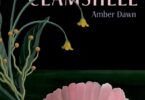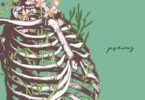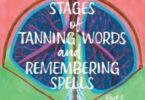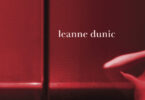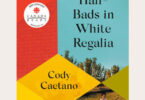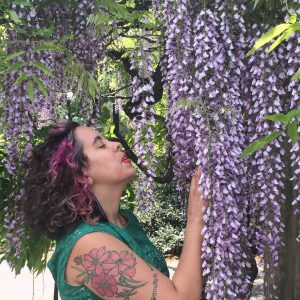 Interview by Rachna Contractor
Interview by Rachna Contractor
Leah Lakshmi Piepzna-Samarasinha is a queer femme sick and disabled Sri Lankan/Irish/Roma writer, performance artist, educator, and hellraiser. The Lambda and ALA Stonewall Award–winning author of Dirty River: A Queer Femme of Color Dreaming Her Way Home, Bodymap, Love Cake, and Consensual Genocide and co-editor of The Revolution Starts at Home: Confronting Intimate Violence in Activist Communities, she co-founded and co-directed QTPOC performance collective Mangos With Chili from 2005 to 2015. A lead artist with disability justice performance troupe Sins Invalid, she frequently performs and tours North America and is currently finishing her new book of essays, Care Work: Dreaming Disability Justice Culture, and a book of poetry, Tonguebreaker. brownstargirl.org has more about her work.
I’ve been watching Leah perform and organize around Toronto for about a decade. I’ve always found her work to be brash and relentless in its ability to hold me gently while slapping me in the face, a challenge to reflect and examine how I interact with myself, my family, and my community. For me, Leah is an embodiment of living unapologetically, a lesson I have taken far too long to learn.
Rachna Contractor: In your memoir Dirty River: A Queer Femme of Color Dreaming Her Way Home, you write about developing compassion for your mom; how did you develop compassion for her? This is a great lesson for so many queers who struggle with familial relationships.
Leah Lakshmi Piepzna-Samarasinha: First, I want to say that I believe that the only person survivors are required to develop compassion for is ourselves. I’m still working on it. There’s an incredible amount of pressure in mainstream society, aka racist, colonialist, ableist rape culture, and also within our own communities—Black and brown communities, and also QTPOC and social justice communities—to forgive, be nice and understanding of the people that hurt us, before we ever get to ask for understanding, compassion, justice, healing, and safety for ourselves. And that’s utter bullshit. Recently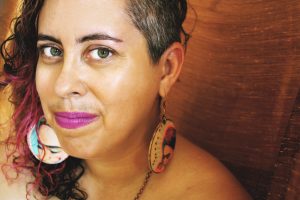 , I helped organize a series of webinars by and for queer femmes about suicidality, in response to the suicides of multiple queer femmes over the past year and a half, and one of the co-facilitators, Maryse Mitchell-Brody, ended one webinar by saying, “It’s totally okay to do emotional labour for yourself first.” That blew my mind. As femmes we face an incredible pressure to anticipate and take care of everyone’s emotional needs before we ever ask anything for ourselves (because then we’re “hysterical” or “high maintenance,” right?). For queer, trans, or two-spirit Black, brown, and Indigenous survivors, we also often feel a huge responsibility to not share our stories—because we need our communities and we’re scared that telling our stories will break our connections to them, and because we don’t want to contribute to any of the stories that are used to further criminalize our people.
, I helped organize a series of webinars by and for queer femmes about suicidality, in response to the suicides of multiple queer femmes over the past year and a half, and one of the co-facilitators, Maryse Mitchell-Brody, ended one webinar by saying, “It’s totally okay to do emotional labour for yourself first.” That blew my mind. As femmes we face an incredible pressure to anticipate and take care of everyone’s emotional needs before we ever ask anything for ourselves (because then we’re “hysterical” or “high maintenance,” right?). For queer, trans, or two-spirit Black, brown, and Indigenous survivors, we also often feel a huge responsibility to not share our stories—because we need our communities and we’re scared that telling our stories will break our connections to them, and because we don’t want to contribute to any of the stories that are used to further criminalize our people.
I didn’t write Dirty River out of a desire to be compassionate to my mom. More than anything, I wanted to write a true, complex story of survivorhood, because there are very few survivor narratives written by queer people of colour, but there are a million versions of those stories in the people and communities I am part of and care about. I called Dirty River a transformative justice abuse survivor narrative when I was pitching it to publishers, and that’s what I think it is. It’s a memoir that exists because of the work of queer feminists of colour like INCITE who have broken silence over the past fifteen years about how violence and abuse operate in the lives of people of colour, and because I wanted to look at the root causes of violence in my abuse story. My abuse story doesn’t happen in a vacuum- it’s not separate from my dad’s and my woundedness by colonization and migration, by how classism and migration wounded my mom, from ableism and my queer, nonbinary femme gender. I wanted to write a depiction of childhood sexual abuse, within a working/mixed-class and mixed-race family, where the mom is the perpetrator—all very rare things to find in literature—that would map intergenerational cycles of trauma and talk about how racism, colonialism, and homophobia play into what makes an abuse story happen. Also, I respect people whose experience is that their abuse perpetrator is 100 per cent a monster, but my experience, like many people’s, is that someone can act abusively and also be someone who loves you or does positive things in your life—and that makes naming and mapping the abuse really complicated. My mom is a survivor, a disabled woman, a raised-working-class woman, someone who fought to change the legacies of violence in her family and succeeded sometimes, and also failed. I wanted to write that story. Because when I looked at the incest memoirs and fiction out there, with a few exceptions—Sapphire, Dorothy Allison, and Chrystos are all writers I’m grateful for—the narratives are very single issue, cis, white, middle-class women with terrible abusers they never have to deal with again. We deserve better and more.
For a lot of survivors, they start with anger and (maybe) get to compassion. It was just this past year that I realized that I’d never really gotten angry at my mom, or grieved not having a mom who was safe. I ran like hell to get away from my parents, and for years my main emotions were a mix of just deep gratitude to finally be free and safe, and frozen terror that they would find me. This year I finally got in touch with that anger and it was beautiful. Audre Lorde said, “Anger is a useful emotion. It tells you that something is wrong.” As Black and brown femme survivors, we are constantly told that we’re “too angry” even when we’re feeling the opposite—when we’re grieving, or quiet, or being nice. It takes a lot of guts to claim anger as a beautiful, healing force in our life. We deserve protection. We deserve to protect ourselves.
RC: You write about stealing a photograph of your ancestors and the feeling of connection.
Had you ever met them? Can you flesh out that feeling of connection when there is so much distance? How much do you let yourself imagine?
LLPS: Like many Sri Lankans living in diaspora, it was difficult for my family to stay physically connected. So many of us couldn’t go back to the island safely for years because of the war. I met my grandparents at birth and when I was four. After that, we didn’t have money to travel to see them—they’d migrated to Melbourne. I grew up in the eighties, and we didn’t have Skype or Facetime—we had thin blue aerogram letters and long-distance calls that were incredibly expensive. So we kept in touch through the mail, phone calls, and presents.
But we also kept in touch through stories. As many South Asians who grew up in diaspora know, home isn’t just in the homeland—it’s in the imagination, the stories, the rumours, the whispered secrets, the objects and photographs. And it’s in how you make Sri Lankanness or your culture where you are. My father told me millions of stories about his and my family growing up, about my aunties and his brother who died and what it was like growing up in Kuala Lumpur and Singapore. However, like a lot of second-generation kids, I rolled my eyes—I didn’t have a context for them at the time, I just knew we were “weird” and desperately wanted to stop being that smelly brown family. As I grew up, I became the one who read between the lines, asked the questions, researched family history, dreamed my way back. I was the second-generation kid who dug in libraries for Sri Lankan histories; as a second-generation/diasporic Burgher, I am one of some of our small community to say that we are not Portuguese people with tans, we are mixed-race Sri Lankans who are the product of rape by European colonizers, who are still very Lankan. Diasporic Lankans have done a lot of work to define who we are, to name colourism, homophobia, casteism, classism, and intercommunity violence in our communities—and in connecting with and supporting folks and activists doing work on the island. Lanka is also in Scarborough, in London, in all the places we end up.
As a long-time resident and lover of Parkdale, I found the writing about the history of Parkdale and Toronto’s activism to be very informative and valuable. Did you intend for that or did it unfold with your own story? How has queer/trans BIPOC activism/organizing changed in Toronto since the nineties?
LLPS: It was on purpose. That was another thing that was hard about getting this motherfurter published—it was just too big and luscious for the white, straight, cis, abled publishing world! Because I very much wanted it to be both a story of “portrait of an artist as a young queer runaway survivor femme of colour” and a story of Toronto in the nineties—to tell what it was like to be in this city when it was big and wild and cheap and Black and brown and anti-colonial in a particular way, at a time where there was so much that wasn’t anywhere else—the kind of queer, pan-diasporic South Asian art and activism and world-making of Desh Pardesh, Camp Sis, and Sister Vision Press and all the nineties queer women of colour activism and writing that honestly I don’t know if it was happening anyplace else the same way. And the publishers kept being like “Huh? Why do you want to tell this city history stuff?” And I was like, because those stories are inseparable! T-dot, queer, POC activism is my survivor story—it’s what saved me! Which is another real difference from that standard survivor narrative, where what saves you is a nice white therapist lady. I couldn’t afford a nice white therapist lady—I got saved by eating dollar samosas with my girls. And I had this big vision of wanting to capture this moment where all these punks of colour left punk, but took DIY and fuck you back to our BIPOC communities. The kind of pan feminist of colour activism that is almost kinda mainstream in the social justice world got created by those bitches.
How have things changed? Shit is a lot more expensive. Toronto is a lot more expensive. We had time that came from being able to pay cheap rent. Cheap rent is a lot harder to find now. So is space. Liberty Village was a whole bunch of actual warehouses. Black and brown people occupied downtown and the West End. Bloor and Lansdowne was “scary” for white people to go to. There was a tremendous amount of green space. I lived in basements, but I had the place to myself for $450. White people were still more afraid of us than wanting to co-opt us.
RC: I like that you name people and call them out sometimes. I found myself trying to put stories together, based on my own memories. Did you change any of the names? How did you come to decide about naming people?
LLPS: I disagree with you—I don’t think of myself as “calling anyone out” in my book. To me “calling people out” is such a loaded term right now, and I don’t relate to it much. I told some stories, and I named some dynamics, moments in history, moments of abuse or love or change or weirdness. I told what is emotionally as true as I can get for me, understanding that there are a million versions of the same story. And I changed all of the names and made composite characters, and that was on purpose. I even changed my parents’ names, which was weird!
Because here’s the thing: I believe in telling the truth, and I believe absolutely in the right of survivor queer femmes of colour to tell our stories. I also believe in figuring out how to do it ethically. And that’s complicated, and there’s not one right answer. I have heard that phrase, “tell the truth; if the people who hurt you wanted you to not tell the story, they should’ve been nicer to you.” And I respect that—but for me, what felt right was changing names and identifying details, for my sake and other people’s, because it was the most ethical and safe way to write the stories I could think of. What I didn’t change were the parts of the story that were mine to tell, and what was emotionally true for me. I went through the book a lot in the months leading up to it finally being published, working as hard as I could to look at it from all angles and to see if there were ways it would hurt people I didn’t want to hurt. People kept being like “congratulations!” and that was real, but I also was frozen with anxiety.
I think there’s often an attitude that memoir isn’t “real literature,” it’s shit talk in book form—and people, particularly people who share small communities with a writer, often both read memoirs trying to figure out “what’s real” and what’s not, and have an impulse to try and figure out “who that’s supposed to be.” I remember someone asking me, very gossipily, who the people “really were” in one of my first autobiographical essays, and being really surprised and not believing me when I told her they all were composites. So what I’ll say is, if you think you know who somebody is, there’s a good chance you’re wrong. It reminds me of Dorothy Allison talking about her process of writing Bastard Out of Carolina, which drew on her own story a hell of a lot, as a white, Southern, poor incest survivor, but was also deeply imagined—and how she had to sit down with her family and tell her sisters, “That part happened, but it happened to you, not to me”
As a queer of colour cultural worker, I—and a lot of other queer writers of colour I know—see my role as writing down and recording some of our communities’ stories—our loves, our movement and relationship breakups, our struggles, exactly all the crazy intense shit that happens. We desperately need to see that reflection of ourselves, to know that we exist, to record our struggles and loves and times. And it’s a real delicate balance to figure out how to do that and stay on the right side of respecting people’s privacy; it’s the #1 question that comes up for POC memoirists and people who work from our own lives. Over and over on tour, femmes of colour and people of colour would thank me for writing this book, and then ask me how the hell I did it, because their family/community might literally kill them if they did, they felt. And some of what I said was what allowed me to write my story was: I changed my last name to reflect both my great-grandmothers’ when I was twenty-one, and that gives me some safety—my parents can pretend they don’t know who the hell I am. I’m estranged from my parents, which is hard but also gives me some breathing room. What I believe is that people have the right to tell their own stories, and that if you write to heal, that intention matters. It’s a process, and there’s not a 100 per cent right answer. I’ve definitely made mistakes and I’ll probably make them in the future. But at the end of the day, I believe in the power of queer femme of colour disabled survivor truths. I want more, not less.
RC: What were your favourite books from 2016? What books are you looking forward to?
LLPS: Fierce Femmes and Notorious Liars by Kai Cheng Thom totally blew me away. I couldn’t put it down and read it all night. Her book is a deep testimony to trans femme on trans femme love, and is a fairytale/creation myth/liberation story. I can’t wait for her book of poetry, A Place Called No Homeland. The Fifth Season by N.K. Jemisin. Spill, by Alexis Pauline Gumbs. Asagi Stories, by Qwo-Li Driskill. I go back to Leanne Betasamoke Simpson’s Islands of Decolonial Love over and over again, and am very excited for her forthcoming book. Same with Amber Dawn’s Where the Words End and My Body Begins, and am very excited to see her next work. My friend Annah Anti-Palindrome’s new book, DNA Hymn. And many pieces of individual writing—Deaf Poets Society published some of the best disabled and Deaf writing and we’re gonna keep doing it! I loved Raymond Antrobus’s “Dear Hearing World” and Carolyn Lazard’s “Colostomy Fannypack,” and I also was honoured to be a part of Sins Invalid’s 2016 show, “Birthing, Living, Dying Crip Wisdom,” and witnessing the performative work of writers like Neve Be, Maria Palacios, and Leroy Moore was everything. And I can’t wait to read Eli Clare’s long-awaited book Brilliant Imperfection: Grappling with Cure.
Rachna Contractor is Reviews Editor for Plenitude Magazine. She has written about literature, art and culture for Xtra, Wiqaable.com and Kala Magazine. She earned a BA in Art History from the University of Toronto. After a decade of working in communications, Rachna moved to the hospitality industry. She is C0-Director of Unforked, a monthly salon that connects food, culture and ideas in Toronto.


